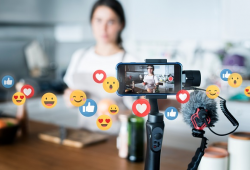In an era where our lives unfold increasingly within virtual spaces, the toll it takes on our humanity becomes a pressing concern. Robert Backer, a distinguished psychologist and neuroscience expert from the University of Pennsylvania, delves into the intricate ways in which digital media is “hacking” the fundamental biology of our brains in his latest piece for The Epoch Times.
Backer’s insights highlight how platforms such as Facebook and Instagram intricately manipulate our brain’s reward system, triggering bursts of dopamine that foster addictive behavior. Sophisticated algorithms capitalize on the vulnerabilities within the human amygdala, exploiting our instinctual responses to novelty and potential threats.
The consequence? A barrage of captivating content that perpetually distracts us, undermining our ability to focus and potentially reshaping how we encode and retain information into enduring memories.
However, amidst the concerns, Backer acknowledges the constructive facets technology offers. It has fueled unprecedented avenues of creativity. Yet, the paradox remains: a hyperconnected world often leaves us starved in vital areas. Meaningful interactions, social skills development offline, and moments of undistracted introspection dwindle in this digital deluge.
In response to this landscape, the author proffers pragmatic solutions. From parental control applications to minimalist phone settings, and conscientious rituals fostering deep socialization and learning, Backer advocates a mindful approach. He contends that while we need not sever ties with technology, a more conscious and value-driven engagement is imperative.
The crux lies not in abandoning technology but in harnessing it with informed intention, aligning it with our true values and priorities as individuals. It’s about reclaiming our agency in a digitally inundated world and forging a balanced relationship that respects our humanity.
As the digital landscape continues to evolve, this exploration invites us to consider the transformative potential of technology while urging us to navigate it with greater mindfulness and purpose.












